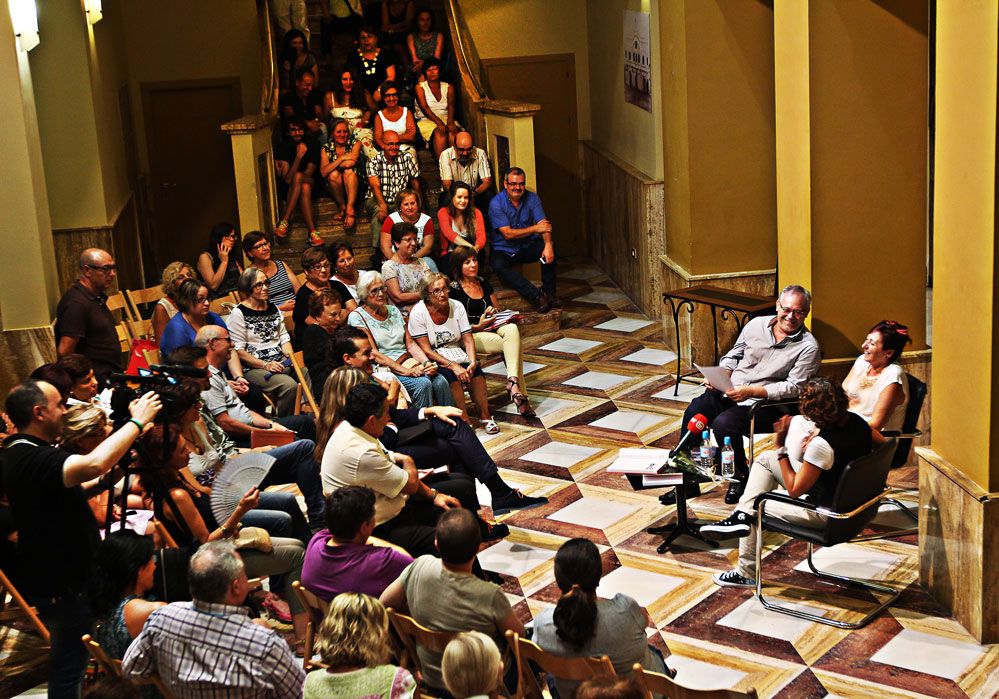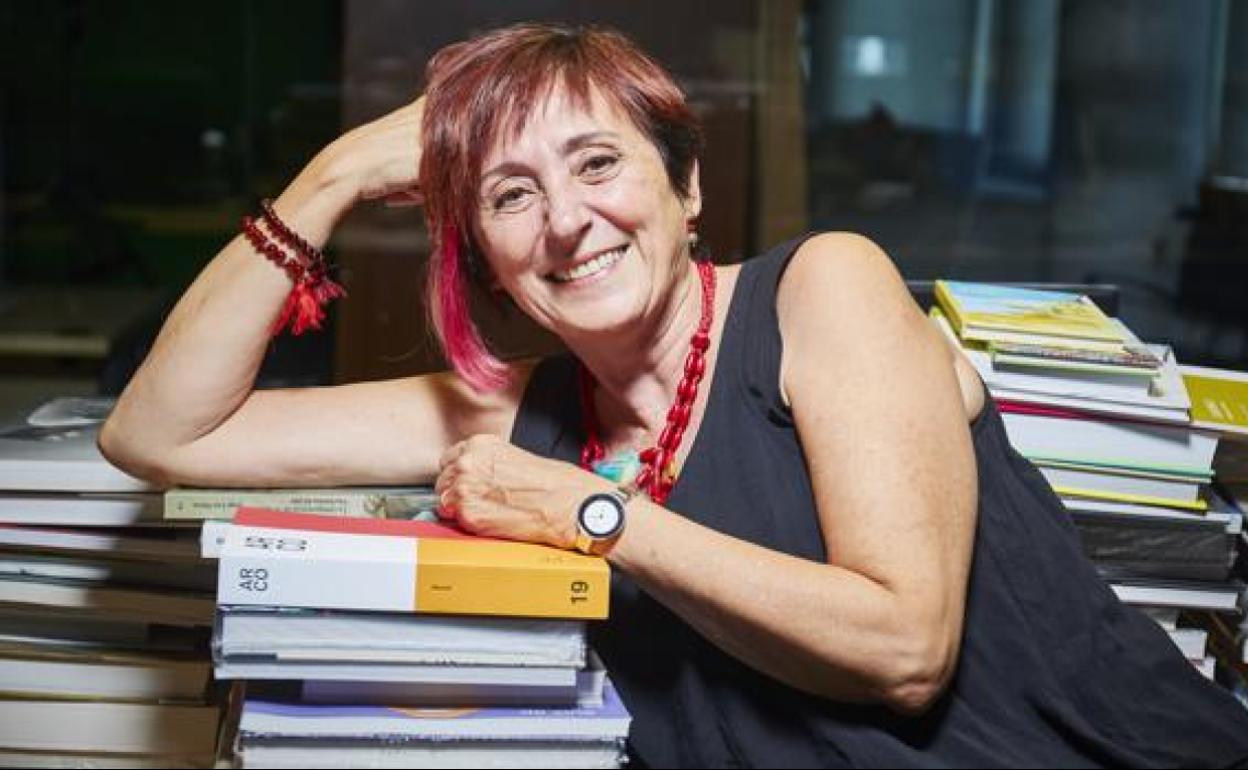La Maga and other cruel stories, of the magnificent writer Elia Barceló, until now the only fantasy writer in Spain. Stay and learn all about this wonderful story!

Elia Barceló presenting his book "La Maga y otros tales crueles".
Elia Barceló, author of La Maga and other cruel tales
Anyone who has read Elia Barceló blindly recommends it, and those who have not, ask where to start, because it has a fairly extensive bibliography. It has not been easy, because for years Elia has been (in practice) the only author of the fantastic genre in Spain, although obviously, there are already many more authors of the genre, but they are not recognized.
Although, she is the only woman who has been nominated for the Ignotus novel between 1992 and 2008 (she is followed by María Concepción Regueiro in 2009); In the “best story” category, we are moving towards the year 2013. In addition, she is the only writer who has won the UPC award, which at the time was considered one of the best science fiction awards in Spain. This is why she is logically a reference.
His first important publication was the collection of stories "Sagrada" (Ediciones B, 1989), although some of these stories were published before in different magazines. That is why it is not surprising that his bibliography is so extensive. To this we add the different genres and disparate locations that Barceló has used. For this reason, choosing at least one work takes us a few minutes of reflection.
Perhaps the most ideal thing is to immerse ourselves in some of the readings and surprise us with everything the author has to say. With so much variety and recommendation, it's hard not to find something we like.
La Maga and other cruel tales
La Maga and other cruel stories, published by Cazador de ratas and awarded the Valencia Critics Award in 2015. It consists of fourteen stories on different themes (some more predictable than others). Starting with stories closer to crime novels, with crimes and mysteries; we go through the world of fantasy at certain times, and we also find completely realistic stories.
The second half of the book focuses on the fantastic and finally we have "La Maga", a short, dreamlike novel that plays with our perception. This gives the book its name and is a magical ending. The ability of this story to make us lose ourselves and find ourselves is so well executed that it makes us feel like puppets, rather than spectators.
This psychological game with the readers happens in most of the stories, for example, in the story «From my window» as well as a nod to rear window, the author plays with the reader's suspicion to give a repulsive and erotic touch. The same thing happens in "Dark as Glass", where she also experiments with the narrator as in "Violet Ink". These together with "The decision of a lady", are key stories, perhaps the best of the compilation, with good characters and an enveloping plot.
We can find double messages (or more) in stories like "Jaime's eyes", where he mixes the past and the present, love with death; and although it can be considered a crime story, there are many other factors that, although the story is short, make it much more complex. The same thing happens in "Annunciation", although here the fantastic side is deeper, as is eroticism.
More about their stories
Elia Barceló uses realism to denounce racism in the story "Invisible Gardens" as well as the disappointments that our idols leave us, when for some reason you stop being idols. In "The Gift", which are two very well-crafted stories, we talk about the situations that we feel close to even though we don't experience them in the same way.
On the other hand in "The arrival", fantasy and realism are mixed as in "The decision of a lady": vocation, life, commitment and wear for things that are not worth it. In this same wave that Elia defines as "modern fantasy", we also find "Ritos", which takes place in a small coastal town where the pastoral becomes terrifying.
Some more attached to fantasy literature would be "The Fifth Law" and "Coward", both fictional stories that explore our future. The first is undoubtedly a tribute to the writer Isaac Asimov, it is full of nostalgia, a look at the past and now; It's about generation gaps and what we really want.
The next one, set in a utopia about the future, is a reaction contrary to what we are used to. It is an elusive story that seeks rereading to get all the juice out of history, where despair is never absent.
In the penultimate story "Alana", Barceló draws on popular children's tales and builds a new story, giving a new meaning to "Little Red Riding Hood", "Sleeping Beauty" and even "Cinderella". The protagonist is a very well thought out character, and although she appears to be the typical "strong female character", she is not without mercy, affection and the problems that she supposes not leading the life that is expected of a woman.
It has many good and bad aspects, which are not left in the background when Martín appears, he knows how to stay aside so that Alana continues to be the undisputed protagonist of the story.
The magician
The last one, «La Maga» as mentioned before, is a short novel that focuses on gothic horror. The literary resource used (epistle) takes us into a haunted house, but it does not have ghosts or any curse. La Maga is a house with a life of its own (similar to the Overlook Hotel in the Shining, a Stephen King story), but it gives instead of receiving, in a toxicity that we discover as the narrative unfolds.
The narrator of the magician and other cruel tales
The narrator plays the most important role in all stories of La Maga and other cruel stories. The same author indicates it in a commentary on «Violet ink». We read the narrator's voice both in the introduction and at the end of each story.
For some this can be annoying and cut the reading thread, for others it seems interesting to know the author's experience and thoughts, about her own works, where they came from, or what she tries to transmit.
In some cases, this interference works to better understand the intention of what the story wants to communicate, and in others, simply to get to know the author better, understand her point of view, her concerns, both as a writer and as a person.
There is a feature that absolutely all the stories share and it is extremely interesting, which are the real locations; they can become more relevant in some stories such as «Ritos», «Invisible Gardens» or «The fifth law», or even become a character, as in «La maga», but even so, in all of them it is important to describe the locations and situate the reader. In addition, they are places that are not often thought of or found, small towns in Spain or environments close to Germany or Austria.
If you found this article interesting, visit our related article full moon summary Spanish novel.
Although you experiment a lot, you never lose the essence and the author's style, clear and concise, with enough details not to be excessive. However, this also meant that some of her stories did not cause an effect beyond appreciating the narrative effort. The most intimate stories are undoubtedly the most enjoyed, although their form is much less complex, for example "The Arrival", "The Fifth Law", "Alana" and even "La Maga".
Final words
La Maga and other cruel tales covers so many genres and literary resources that it is practically impossible for someone not to like it, what is certain is that it will come to each reader in a completely different way, at the same time that it is a wonderful resource to discover interesting features of Elia Barcelo.
It is common at first to wonder why readers gravitate to the work of such a prolific writer. But without any doubt, La Maga and other cruel tales It is a good way to understand why, especially if we are willing to discover the cruelty behind each story.
More stories from the author
Other interesting stories by Elia Barceló are: El contricante (terror), El Hipogrifo (in Lengua de rag) (science fiction), Terrible Costumes (Lengua de rag) (metaliterary fiction).
His novel the goldsmith's secret (rag language) has been translated into six languages and has given him great international recognition. He has also written youth novels such as The Case of the Cruel Artist (Edebé Prize for Youth Literature), or La Roca de Is, he has also made more than thirty police and fantasy stories, which have been published in Spain and foreign countries.
In addition to a quite interesting essay book on the archetypes of terror in the stories of Julio Cortazár entitled the disturbing familiarity. With the book "El mundo de Yarek" she was awarded the title "Great Spanish Lady of Science Fiction".

